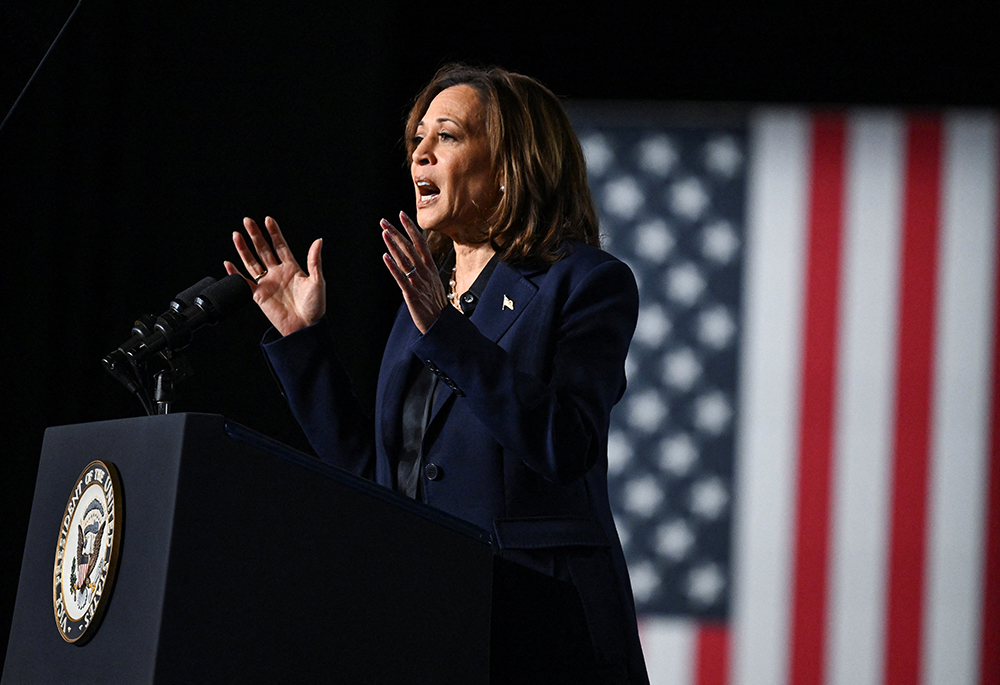
Democratic presidential nominee U.S. Vice President Kamala Harris speaks during a campaign event Oct. 17 in Green Bay, Wisconsin. (OSV News/Reuters/Vincent Alban)
Vice President Kamala Harris' closing message is a case study in political malpractice.
Harris uses Trump's own derogatory words about workers when campaigning for union votes. She plays video of him championing his role in overturning Roe v. Wade. On Monday (Oct. 21), Harris held three events with former Rep. Liz Cheney, Republican of Wyoming, all focused on the threat Trump poses to democracy.
On the airwaves, Trump's references to the size of golfer Arnold Palmer's private parts led virtually every news show. Every commentator noted how inappropriate or unusual or unpresidential the remarks were. Last week, Trump's boorish remarks at the Al Smith dinner (Oct. 17) captured the headlines.
The problem with throwing mud at someone who is already covered in mud is this: It just blends in. People know Trump says outrageous things. If discussing sexual assault on the "Access Hollywood" tapes didn't cost him the 2016 election, discussing Arnold Palmer's endowment won't cost him the 2024 election.
What is more, the attacks on him for breaking the rules of appropriateness only endear him to his base. They hate the elites who promulgate the rules but lack the power to stand up to them. Trump is their champion. They don't care that he lies, or that he is crass, or any of it. They sniff — and they aren't wrong — that America's elites despise the working class. And so they are returning the love.
Advertisement
This is what special counsel Ken Starr never understood about former President Bill Clinton's affair with Monica Lewinsky never translating into anger among most voters. They already knew he slept with other women, that it was part of his "bubba" personality. I wish Clinton had found a way to express his "bubba"-side that did not involve adultery, but without that "bubba" part of his character, he was just another resume-building Rhodes scholar.
Last month (Sept. 25), Harris delivered a speech at the Economic Club of Pittsburgh. I thought it was pretty good, but noted at the time that Harris might have strengthened the speech by appealing to moderate voters and acknowledging the degree to which Democrats were complicit in the reign of neoliberalism and its market orthodoxy. I also noted she needed a better narrative about the economy, the effects of the pandemic, and maybe even admit the economic difficulties were not entirely the fault of former President Donald Trump.
I can sketch that narrative in a few sentences:
The pandemic dislocated the economy in ways none of us had ever seen before. In the past three and one-half years, President Biden and I have tried to not just steady the ship, but to get the ship moving in the right direction again. It has taken longer than any of us wanted, and we are still working to find ways to lower the cost of living, but we are making progress.
Why can't Harris say that? And then say it again. And again. When people feel unsure about something, they want a map. A narrative is a map.
The best part of that Pittsburgh speech was the invocation of Franklin Roosevelt and his commitment to "bold, persistent experimentation." This captures both the innate pragmatism of the American national character and the idea that the government is working to make things better for average people. Maybe she has repeated that line, but it hasn't broken through.
Since becoming the nominee, mindful that every poll shows the economy is the No. 1 issue on people's minds and that she and the Democrats trail Trump and the Republicans among voters on who can better handle the economy, every time Harris is talking about something other than the economy, she is talking about the wrong thing.
Lastly, Harris has still failed to have a "Sister Souljah moment," that is, finding a time and place to indicate to voters who worry she may be too uncritically liberal that she is willing to distance herself from some extreme position. Instead, her overly cautious interviews lead people to conclude she is never going to challenge conventional wisdom, even when it is wrong.
The reason Harris' closing message is so foolish is that people made up their mind about Trump a long time ago. It is Harris who is less well known. Leading with a message focused on her own economic vision would not only address voters' top concern. It also would allow Harris to define herself.
Instead, Trump is defining Harris in his closing message. In an election this close, the candidate with the best closing message may win.
Leading with a message focused on her own economic vision would not only address voters' top concern. It also would allow Harris to define herself.







